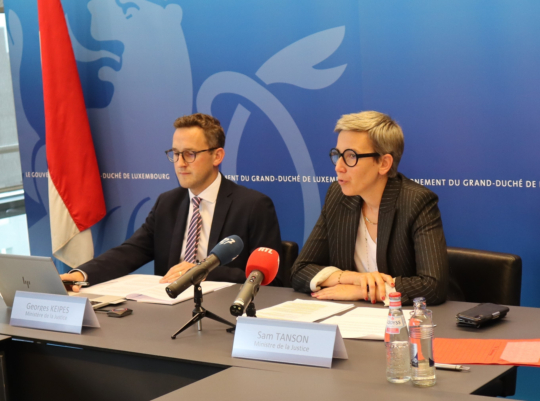 (L-R) Georges Keipes, Ministry of Justice; Sam Tanson, Minister of Justice;
Credit: MJUST
(L-R) Georges Keipes, Ministry of Justice; Sam Tanson, Minister of Justice;
Credit: MJUST
On Friday 10 June 2022, Luxmbourg's Minister of Justice, Sam Tanson, presented the planned changes to the law on security companies.
The purpose of the bill is to make amendments to the law of 12 November 2002, following the discussions raised regarding the powers of security companies in the public space.
In this case it is:
- the introduction of the so-called “events” activity, as a fifth activity, subject to the law of 12 November 2002, the exercise of which will henceforth require the granting of an authorisation;
- provisions aimed at better delimiting private security missions from public security missions, a mission reserved exclusively for the police;
- provisions aimed at specifying and clarifying the rights and obligations of security guards in relation to the people they are likely to control;
- regulations on the use of guard dogs;
- the introduction of administrative fines for security companies;
- regulation of subcontracting in terms of guarding;
- the introduction of fees for the processing of applications submitted for the granting of authorisations, approvals and licenses provided for by the law of 12 November 2002.
The so-called "events" activity concerns cultural, sporting or other events and limits the control missions of security companies to five in number: the age of the person, his entry title, the concordance of the title nominative with his identity, the control of objects not allowed or prohibited by law and finally the behaviour of the person during the event. Controls require the consent of the person. In case of refusal, access may be refused.
During an event organised in a public place, the organiser who engages the security company must make a declaration to the municipality concerned with indication of the information of the event, in particular the security measures envisaged. The perimeter of intervention will be delimited.
Security guards must wear a uniform and carry a legitimation card. They will be strictly forbidden to carry a weapon for the exercise of their missions during event activities.
The bill also includes rules for the use of dogs. Dangerous dogs are prohibited and a diploma course is mandatory for both the dog and its master. In parallel with the tabling of the law, work on the implementation of adequate training for security guards will continue.








